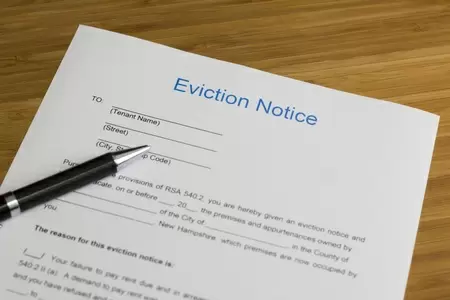
If you are a landlord, owner or property manager, you may have to deal with evicting one of your tenants. Eviction may be necessary for many reasons. It can be because of late rent, the property being damaged by the tenant, or many other circumstances. Whatever the reason, there is a clearly defined legal process that must be followed. Let’s take a quick look at the five-step process that all Michigan owners and property managers must go through.
 Issue a Warning Letter
Issue a Warning Letter
Sending a letter is the first step, though this letter is not a notice to vacate or an official first action. This letter simply serves as a way to clearly define the reason for starting your eviction process. This can be for nonpayment of rent or damages to the property and you can outline the remediation needed to prevent further action on your behalf. This letter informs the tenant of your intent and, in the best case scenario – say unpaid rent – this notice may show your renter that you mean business and will spur them to get their late rent paid up or take care of the issue.
Serve Legal Notice on Your Tenant
The next step in your legal process is to make it official with a notice. This notice will give the tenant all of the information they need to follow the eviction process in addition to the time frame they have to vacate the premises. This time period usually ranges from seven to 30 days, though circumstances vary depending on the type of notice and the specifics of your situation, notes the Rental Property Owners Association.
When tenants receive this notice for late rent, they do have the option to submit a partial payment. This can mean several things. Also, partial payments offer no guarantee because only a full payment of the demand amount negates the notice. Read more about accepting partial payments here.
File Your Complaint in Court
If you’ve sent your notice and the tenant has not vacated the property by the end of the time frame you outlined, then it is time to file a formal complaint with the district court. Make sure to bring a copy of the lease to this date, along with any other necessary paperwork that shows outstanding payment or damages and a copy of your legal notice. You often will receive a hearing date and have to pay filing fees at this time.
Attending the Court Hearing
Be early to your hearing and be prepared to answer questions that the judge may have for you regarding the nature of your rental agreement. If the tenant does not appear, you may be awarded a default judgment, which essentially means that you can legally move forward with the eviction process. The court may also side with your tenant or postpone the hearing, though having all of your paperwork and documentation ready and backed by the assistance of The Law Offices of Aaron D. Cox PLLC can help you present the best possible case.
Court-Ordered Eviction
Following a judgement in your favor, your tenant will usually have around 10 days to vacate the premises. If they do not, the owner can return to court for a legal order of eviction, which gives power to a local authority to physically evict the tenant. This is generally performed by a local sheriff or other court-appointed officer who will show up to the residence to assist in the eviction.
The sheriff will stand guard as you move the renter’s items out of the home. Once everything has been removed, you may change the locks or access codes and secure your property so that you can move forward with repairs and re-renting as needed. Be aware that there are also some rules about evicted tenant’s property – more on that in this earlier blog.
Let Us Help
At The Law Offices of Aaron D. Cox PLLC, we know the eviction laws in Michigan well and have worked with numerous landlords and property owners to resolve their tenant disputes and handle the eviction process. We’ve worked with our clients to resolve a full range of landlord-tenant issues, and we can do the same for you. To learn more or to schedule a consultation to discuss your case, call us today at 734-287-3664.
